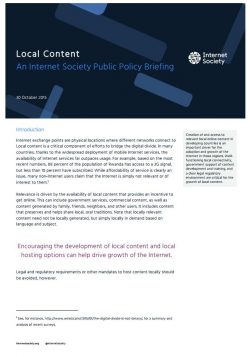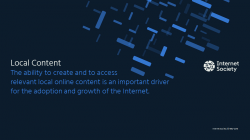Introduction
Local content is a critical component of efforts to bridge the digital divide. In many countries, thanks to the widespread deployment of mobile Internet services, the availability of Internet services far outpaces usage. For example, based on the most recent numbers, 88 percent of the population of Rwanda has access to a 3G signal, but less than 10 percent have subscribed. While affordability of service is clearly an issue, many non-Internet users claim that the Internet is simply not relevant or of interest to them. [1]
Relevance is driven by the availability of local content that provides an incentive to get online. This can include government services, commercial content, as well as content generated by family, friends, neighbors, and other users. It includes content that preserves and helps share local, oral traditions. Note that locally relevant content need not be locally generated, but simply locally in demand based on language and subject. Encouraging the development of local content and local hosting options can help drive growth of the Internet. Legal and regulatory requirements or other mandates to host content locally should be avoided, however.
Key Considerations
There are a number of key considerations with regard to local content availability and usage.
> Language. The English language is significantly overrepresented in Web content in comparison to the number of English speakers online. This is largely for historical reasons: the pioneering role of the United States in developing the Internet and its content, the outsize role of English offline, and the earlier technical challenges of non-English alphabets.
> Content distribution. Existing commercial content may be locally relevant, but not available in a country for a variety of reasons, including a lack of licensing distribution agreements. This may, in turn, result from a country’s copyright regime and enforcement, which can also limit the development of new content. .
> Location. Most, if not all, countries have existing locally relevant content, originating from international sites of interest, as well as local ones. But where content is stored and distributed also has an impact on usage. Content for developing countries is typically hosted overseas. Downloading it requires expensive international links, which incur significant latency and, as a result, reduce demand.
> Development. The Internet has created a global platform for consuming interesting content, as well as for producing, distributing, and monetizing content. Since users and entrepreneurs generally are likely to create content and services to fill a gap in their own environment, encouraging local content development, both commercial as well as user-generated, is a key consideration in making more locally relevant content available.
Challenges
There are a number of challenges involved in increasing the amount of locally relevant content.
> Technical issues. Historically, Internet naming was based on the English alphabet. This created challenges for many languages, including Chinese and Russian. In 2009, however, the Internet Corporation for Assigned Names and Numbers (ICANN) introduced the use of Internationalized Domain Names (IDNs) [2], which are now in use, and today efforts are being made to enable non-English in email headers. Still, the building blocks for generating new content, such as software development kits, may not be available in accessible languages—another barrier to content creation.
> Filtering and blocking. Governments can enact laws and measures that restrict online content that they deem to be undesirable for religious, social, legal or political reasons. This alone can impact the availability of international and local content of interest; uncertainty about how the laws will be interpreted and enforced can further increase this impact.
> Local hosting. For developing countries, it is typically cheapest to host content abroad, where large data centers have significant economies of scale and lower operating costs. In addition, there is often a perception of higher technical competence and better service quality from overseas data centers. Legislation and regulation, which affect the liability of content developers, the companies hosting content, and intermediaries that distribute content, can also have an impact on hosting decisions. Encouraging, but not requiring, more local hosting will make locally relevant content more accessible.
> Content creation. Developing content requires Internet access and some level of technical knowledge and skill, which are not always available. Further, entrepreneurs often need the ability to both fund and sell their services, which can be ensured through various means including an appropriate copyright regime. This is particularly complicated in countries where there are few or no options for online payments (e.g., PayPal) and where mobile app stores are not allowed to sell apps or deliver payments do not enable users to buy and/or sell apps.
Promoting the availability of locally relevant content makes the Internet more attractive for both existing and new users. This can lead to users creating more content, which will further help to attract new users in a virtuous cycle of growth.
Guiding Principles
The Internet Society is guided by the vision that the Internet is for everyone. It is our priority to seek ways to create an enabling environment for the creation, access, use, and dissemination of Internet content. As noted, there are a number of roadblocks to increasing the availability of locally relevant content that must be addressed, including a technical platform for developing and distributing content, favorable policies for the creation of content, and facilities to locally host the resulting content.
On the technical side, open standards that facilitate the use of non-English characters create the platform for the creation and consumption of local content by everyone. More generally, these open standards enable a global network over which all users can communicate and provide the basis for entrepreneurs to develop and distribute their own content.
To help develop locally relevant content, governments can seed the market by developing their own content. This will result in content of local interest, as well as help create local capabilities for developing and hosting such content and increase the usage of a local Internet exchange point (IXP). In addition, governments can help to promote content creation via capacity building to provide the skills and fostering a financial system that enables online payments.
To enable the local hosting of locally relevant content, a number of important issues must be addressed:
1 It is important to have a well-functioning IXP, through which all Internet service providers (ISPs) can efficiently access locally stored content. [3]
2 Local data centers must understand the needs of the local content market, and in turn, the local content market must understand the capabilities and advantages of the local data centers.
3 Where there are gaps in technical skills, the government can play an important role in helping to ensure relevant training.
4 There needs to be clarity regarding a government’s legal and policy positions, specifically with respect to content and limited intermediate liability.
In a study the Internet Society conducted on local content in Rwanda, we found that when content was hosted locally, the costs and latency for viewing the content went down and the content was more accessible for users. When a large content-delivery network opened a cache in Rwanda in late 2014, demand for content doubled within several months because the content loaded faster. [3] Over time, this will likely increase the amount of relevant content locally hosted.
Our overriding principle for development is the promotion of an open Internet in which users can access the content of their choice and engage in what we call permissionless innovation. [5] Government policies that limit open access, that do not offer adequate and effective intellectual property protection and appropriate limitations of liability for intermediaries that host content, will restrict local-content production and availability.
Further, while we encourage local content hosting as an option, we do not believe local hosting of content or other data should required or mandated for any reason, including reasons of economics, security, or privacy.
As more locally relevant content becomes available, more users will take advantage of available Internet access and come online. This will help to bridge the digital divide and create a healthy ecosystem in which users are not just consuming more locally relevant content, but also creating their own content. A move that we believe will further increase the breadth and depth of offerings available on the open Internet.
Additional Resources
The Internet Society has published a number of papers and additional content related to this issue. These are available for free access on the Internet Society website.
> Internet Society report, Promoting Local Content Hosting to Develop the Internet Ecosystem, http://www.internetsociety.org/doc/promoting-local-content-hosting-develop-internet-ecosystem
> Internet Society, OECD, United Nations Educational, Scientific and Cultural Organization report, The Relationship Between Local Content, Internet Development, and Access Prices, http://www.internetsociety.org/localcontent
> Internet Society’s Global Internet Report, http://www.internetsociety.org/globalinternetreport/
> Internet Exchange Points (IXPs) Information, http://www.internetsociety.org/what-we-do/issues/internet-exchange-points-ixps
> Permissionless Innovation Blog Posts, http://www.internetsociety.org/tags/permissionless-innovation
Notes
[1] See, for instance, http://www.wired.com/2015/01/the-digital-divide-is-not-binary/, for a summary and analysis of recent surveys.
[2] Prior to that decision, it was possible to use non-ascii characters in some parts of a domain name, but not as part of a top level domain.
[3] Internet Society report, Promoting Local Content Hosting to Develop the Internet Ecosystem, http://www.internetsociety.org/doc/promoting-local-content-hosting-develop-internet-ecosystem.
[4] For information about IXPs, see http://www.internetsociety.org/what-we-do/issues/internet-exchange-points-ixps.
[5] For information about permissionless innovation, see http://www.internetsociety.org/tags/permissionless-innovation.

